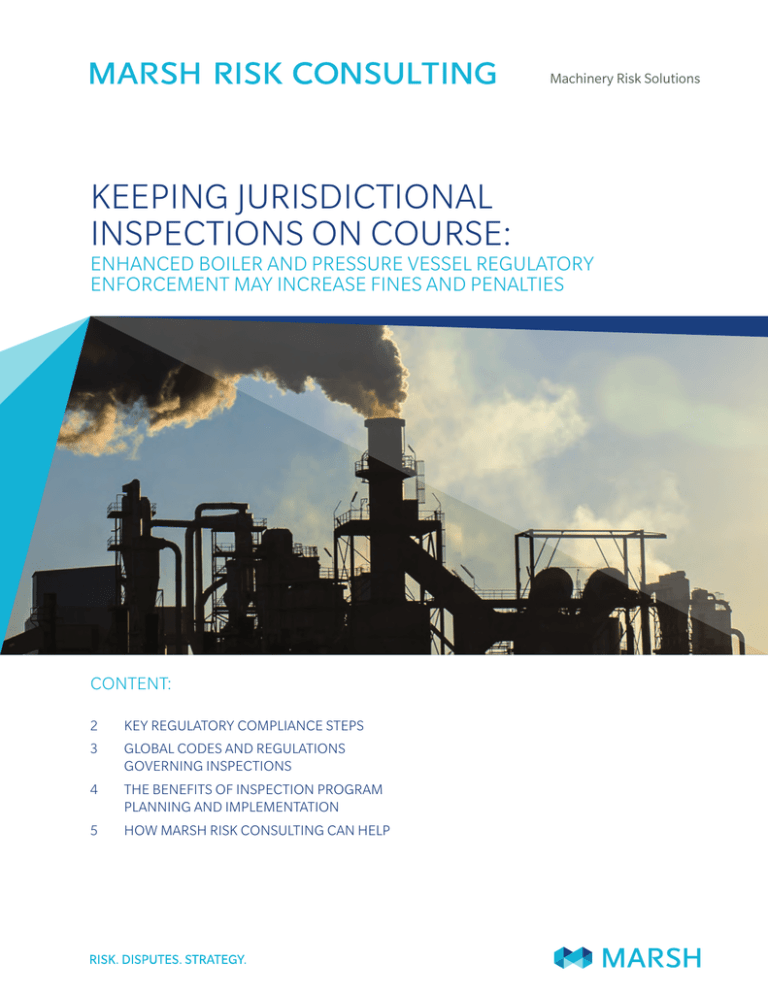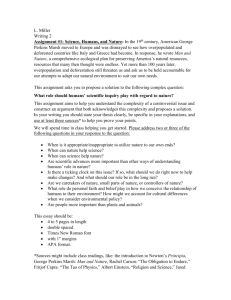
Machinery Risk Solutions
KEEPING JURISDICTIONAL
INSPECTIONS ON COURSE:
ENHANCED BOILER AND PRESSURE VESSEL REGULATORY
ENFORCEMENT MAY INCREASE FINES AND PENALTIES
CONTENT:
2
KEY REGULATORY COMPLIANCE STEPS
3
GLOBAL CODES AND REGULATIONS
GOVERNING INSPECTIONS
4
THE BENEFITS OF INSPECTION PROGRAM
PLANNING AND IMPLEMENTATION
5
HOW MARSH RISK CONSULTING CAN HELP
Several US jurisdictions have adopted regulations permitting the issuance of monetary fines
for violations of boiler and pressure vessel regulations. Other jurisdictions have drafted similar
regulations that are awaiting approval. These monetary fines can range from hundreds of
dollars to more than US$1000 per jurisdictional object for regulatory violations.
Many states and some cities issue certificates permitting the continued operation of
certain equipment such as boilers, water heaters, pressure vessels, heat exchangers, etc.
Statutory regulations require periodic inspections to renew the certificates of operation.
Commissioned inspectors (CI), under the employ of an Authorized Inspection Agency (AIA,
i.e., an insurance company), or inspectors employed by the jurisdictional authority are
properly licensed to ensure compliance with the American Society of Mechanical Engineers
(ASME) Boiler & Pressure Vessel Code, National Board Inspection Code (NBIC), and
individual jurisdictional requirements.
If you own or operate equipment that requires a certificate of inspection to operate legally,
you need to take important steps to maintain regulatory compliance and mitigate the
potential for fines.
“The thought
process of planning
and implementing
an inspection
program for boilers
and pressure
vessels will help
ensure compliance
and alleviate
potential civil fines.”
KEY REGULATORY COMPLIANCE STEPS
First, a planning process should surround a well-managed inspection program. This includes
conducting a complete inventory of boilers and pressure vessels subject to inspection. The
inventory list should be comprehensive and include, but not be limited to, information about
each boiler or vessel:
•• Type.
•• Year.
•• Location.
•• Size.
•• Use.
•• Design criteria.
•• Overpressure protection data.
•• Certificate expiration date.
The inventory list may also include boilers and vessels that fall outside a regulatory
inspection but are equally important from a safety, reliability, and mission-critical standpoint.
Second, obtain and maintain the original documentation such as system drawings,
engineering files, and manufacturers’ data reports for each boiler and vessel. The
manufacturers’ data reports are critical to identify all design criteria to complete a code
repair or alteration.
2 • KEEPING JURISDICTIONAL INSPECTIONS ON COURSE
Next, determine the steps required to prepare properly for the object inspection. This task
may differ depending on equipment type and/or type of inspection required. Prioritize
the object inspections based on certificate expiration date and allow sufficient resources
to adequately prepare the equipment for a thorough and seamless inspection. Frequent
communication and scheduling of inspections with your AIA is necessary to facilitate an
on-time inspection. This will also allow sufficient time to correct any code violations so as to
avoid civil penalties.
Finally, manage the change of service for boilers and pressure vessels. Safety must always
take center stage when removing equipment from service or installing new equipment. The
final installation will consider jurisdictional requirements; therefore, a CI should always be
included in the planning stages. Jurisdictional notice from the AIA for removal and installation
of new equipment subject to inspection is required. The management philosophy regarding
equipment change must be appropriate to the circumstances; otherwise, the resultant loss to
the vessel, surrounding property, and to human life could be tragic.
GLOBAL CODES AND REGULATIONS
GOVERNING INSPECTIONS
In North America, design and certification is governed by the ASME Boiler and Pressure
Vessel Code or API Standard 620, which provides rules for lower pressure vessels not
covered by the ASME Code in North America.
From an international perspective, codes may include the European Union’s Pressure
Equipment Directive (PED), Japan’s Industrial Standard (JIS), Canada’s CSA B51, Australia’s
Australian Standards, and other international standards like Lloyd’s, Germanischer Lloyd,
Det Norske Ventas, and Société Générale de Surveillance (SGS S.A.).
Marsh Risk Consulting • 3
US state codes vary with regard to the size of boilers and vessels subject to regulatory
inspection. In addition, the frequency of required inspections varies from state to state.
However, by definition, a “boiler” is typically defined as “a closed vessel in which water
or other liquid is heated, steam or vapor is generated, steam is superheated, or any
combination thereof, under pressure or vacuum, for use external to itself, by the direct
application of energy from the combustion of fuels, from electricity or nuclear energy.”
This definition includes water heaters that exceed 200,000 Btu/hr heat input, 200 degrees
Fahrenheit at the outlet, or 120 gallons nominal water containing capacity. Also included are
fired units for heating or vaporizing liquids other than water where these units are separate
from processing systems and are complete within themselves.
“We offer solutions
across a broad
spectrum of risks.”
“Pressure vessels” are enclosed vessels or tanks used to store a liquid or gas under pressure.
Typically these vessels are wide in scope and have a maximum internal or external allowable
working pressure greater than 15 psig and/or an inside diameter, height, width, or crosssectional diagonal exceeding six inches per ASME. Liquefied petroleum gas (LPG) i.e., propane,
propylene, butane, and butylene) vessels and low temperature cryogenic vessels (i.e., liquid
hydrogen, nitrogen, and helium) may be included depending on the installed location.
THE BENEFITS OF INSPECTION PROGRAM PLANNING
AND IMPLEMENTATION
The thought process of planning and implementing an inspection program for boilers and
pressure vessels will help ensure compliance and alleviate potential civil fines. Programs will
vary from one facility to another, but the basic ingredients are still similar. Because it can be
a monumental task, the responsible individual should consider performing the program in
phases and even concentrating the effort on individual systems for larger facilities to keep
4 • KEEPING JURISDICTIONAL INSPECTIONS ON COURSE
the program manageable. When developed and executed methodically, however, such
a program allows for regular, timely, and cost-efficient inspection of critical systems and
supports full compliance of jurisdictional regulations.
HOW MARSH RISK CONSULTING CAN HELP
Marsh Risk Consulting’s (MRC) Property Risk Consulting Practice includes a team of boiler
and machinery risk professionals with knowledge of the risk control aspects of importance
to businesses, their insurers, and local regulatory authorities.
We offer clients a broad range of fully integrated services in areas such as:
•• Machinery reliability risk analysis.
•• Operations and maintenance performance auditing.
WEB SITES OF RELEVANT
REGULATORY AND
STANDARDS BODIES
US Occupational Health and
Safety Administration
https://www.osha.gov
•• Managing risk or performance of third-party suppliers.
•• Contingency planning for interruption of steam, electricity, or fuel.
•• Energy supply management and reliability.
•• Spare parts surveys.
•• Cost structure identification.
American Society of
Mechanical Engineers
https://www.asme.org
National Board
http://www.nationalboard.org
•• Emergency and secondary systems review.
We offer solutions across a broad spectrum of risks, including, but not limited to, power and
utilities, energy, chemical, transportation, health care, and manufacturing.
Marsh Risk Consulting • 5
To learn more about relevant US state laws and our boiler and machinery risk
management solutions, please contact your local Marsh representative or MRC
professional. You can also reach our experts directly as follows:
Phone: 866 9AtRisk (866 928-7475 in the United States and Canada
or +1 212 345-9589)
E-mail: Marsh.PropertyRiskConsulting@marsh.com.
Further insight and related solutions can be found on: www.marsh.com or
www.marshriskconsulting.com.
Marsh is one of the Marsh & McLennan Companies, together with Guy Carpenter, Mercer, and Oliver Wyman.
This document and any recommendations, analysis, or advice provided by Marsh (collectively, the “Marsh Analysis”) are not intended to be taken as
advice regarding any individual situation and should not be relied upon as such. This document contains proprietary, confidential information of Marsh
and may not be shared with any third party, including other insurance producers, without Marsh’s prior written consent. Any statements concerning
actuarial, tax, accounting, or legal matters are based solely on our experience as insurance brokers and risk consultants and are not to be relied upon
as actuarial, accounting, tax, or legal advice, for which you should consult your own professional advisors. Any modeling, analytics, or projections are
subject to inherent uncertainty, and the Marsh Analysis could be materially affected if any underlying assumptions, conditions, information, or factors
are inaccurate or incomplete or should change. The information contained herein is based on sources we believe reliable, but we make no representation
or warranty as to its accuracy. Except as may be set forth in an agreement between you and Marsh, Marsh shall have no obligation to update the Marsh
Analysis and shall have no liability to you or any other party with regard to the Marsh Analysis or to any services provided by a third party to you or Marsh.
Marsh makes no representation or warranty concerning the application of policy wordings or the financial condition or solvency of insurers or re-insurers.
Marsh makes no assurances regarding the availability, cost, or terms of insurance coverage.
Copyright 2014 Marsh LLC. All rights reserved. Compliance MA14-12741 6309



